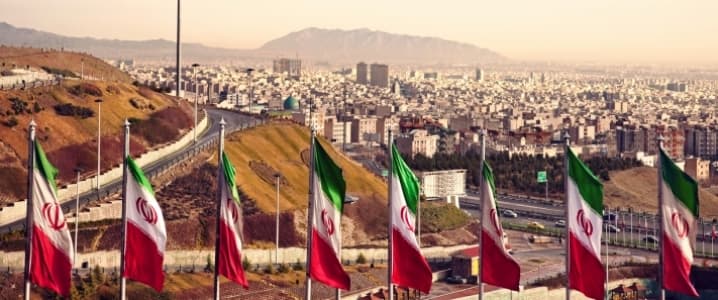A conservative win at the polls in Iran could set in motion a response from Washington that puts billions of dollars of Asian and European oil money at risk.
Iranians took to the polls four years ago to elect moderate President Hassan Rouhani, who promised to negotiate a deal with the United States and allied western powers on the country’s controversial nuclear program. Now Iran is back in the global oil market, and foreign companies are eyeing lucrative projects—but this Friday could undo everything.
Three years of international sanctions had crippled the country’s oil-based economy, prompting the swift ousting of President Mahmoud Ahmadinejad, a political figured long-reviled by the West for his anti-Americanism, anti-Israel posturing, and alleged Holocaust denial.
In two days, Iranians are once again due at the polls.
Last month, the Guardian Council picked six candidates out of the 1,636 who registered for a chance to run. The incumbent, Rouhani, and his current vice president, Eshaq Jahangiri, showed up on the short list, as well as the mayor of Tehran, Mohammad Bagher Ghalibaf. Ahmadinejad and his former VP had also put their names in the hat, despite being explicitly told not to run by Ayatollah Khamenei earlier this year. Both were disqualified. Related: Russia Reemerges As China’s Top Crude Supplier
The past couple of days have seen two major dropouts and subsequent endorsements. Ghalibaf, who has lost presidential races twice before, withdrew on Monday, publishing a letter that admonished Rouhani and his administration for being “pseudo-revolutionary opportunists.” The mayor then endorsed cleric Ebrahim Raisi for the top political position.
Ghalibaf’s measure of ideological fitness for office reflects a preference for leaders who stand firmly against the U.S. for its historical backing of the unpopular Reza Shah, who was forced into exile in 1979 to allow for the return of Ayatollah Khomeini for the construction of a new Islamic regime. To strict conservatives, Rouhani’s deal with western powers, which allows international observers to regularly visit Iranian nuclear facilities, represents a cozying up to hostile powers that contradicts the principles of the revolution.
And then yesterday, Jahangiri dropped out, urging people to vote for Rouhani in order to ensure the full and continued adherence to the nuclear deal, officially known as the Joint Comprehensive Plan of Action (JCPOA).
Iran’s reentry into global oil markets has stabilized the value of the rial, paving the way for the nation to compete economically once again, the VP argued.
“We need to become developed in order to accomplish a better life,” he said. So far, all candidates have agreed to abide by the terms of the JCPOA, if elected.
Since restrictions were lifted last January, Iran has mostly recovered its oil output to pre-sanctions levels. The Organization of Petroleum Exporting Countries’ (OPEC) recent deal to cut output by 1.2 million barrels per day represents Tehran’s biggest roadblock in increasing production even further, although the 90,000 bpd increase that was allowed by the bloc was still celebrated as an overall diplomatic victory.
Still, the biggest risk to Iran’s status quo rests on the tone that Tehran conveys to the international community regarding the nation’s willingness to share the Middle East with Saudi Arabia and Israel.
"Raisi would likely support the provocative military and regional policies that are already imperiling the nuclear agreement and are leading to increasing calls in Washington to reinstate extra-territorial sanctions," Helima Croft of RBC Capital Markets wrote in a note to investors earlier this week. The consequences of this stance could lead to more "ballistic missile tests, arms shipments to the Houthi rebels and Syrian President Assad, and aggressive naval maneuvers in the Straits of Hormuz.”
Related: Oil Prices Edge Higher As U.S. Oil Inventories Fall Again
Does Iran’s Foreign Politics Affect its Role in the Global Oil Market?
The JCPOA do not directly tie in Iran’s behavior in regional disputes to participation in global oil markets. The two are separate issues. But further geopolitical distance from American or western foreign policy could cause U.S. President Donald Trump’s failure to certify to Congress that Iran remains compliant with the JCPOA, as he must do every 90 days.
ADVERTISEMENT
In April, the State Department accepted Iran’s compliance, but added that the deal, as a whole, was “under review.” An official thumbs-down to the agreement from the White House would have little to no economic consequences for the U.S. because sanctions still prevent American oil majors, such as Chevron and ExxonMobil, from pursuing deals in the Middle Eastern country.
But billions of dollars in investments by Asian and European countries would stand on unstable ground if Trump’s certification falls through the cracks.
In Raisi’s eyes, Trump’s misadventure in denying Iran due certification for compliance to the deal would embolden conservative anti-American elements in Tehran. The economic hit of failed contracts would be deadly, but would Russia and China stand by the U.S.’ break from a meticulously negotiated deal? Unlikely.
By Zainab Calcuttawala for Oilprice.com
More Top Reads From Oilprice.com:
- Artificial Intelligence Is Crucial For The Energy Industry
- Trump-Xi Deal Could Fuel A U.S. LNG Boom
- Non-OPEC Compliance Lags At 66% As OPEC Seeks To Extend Deal


















